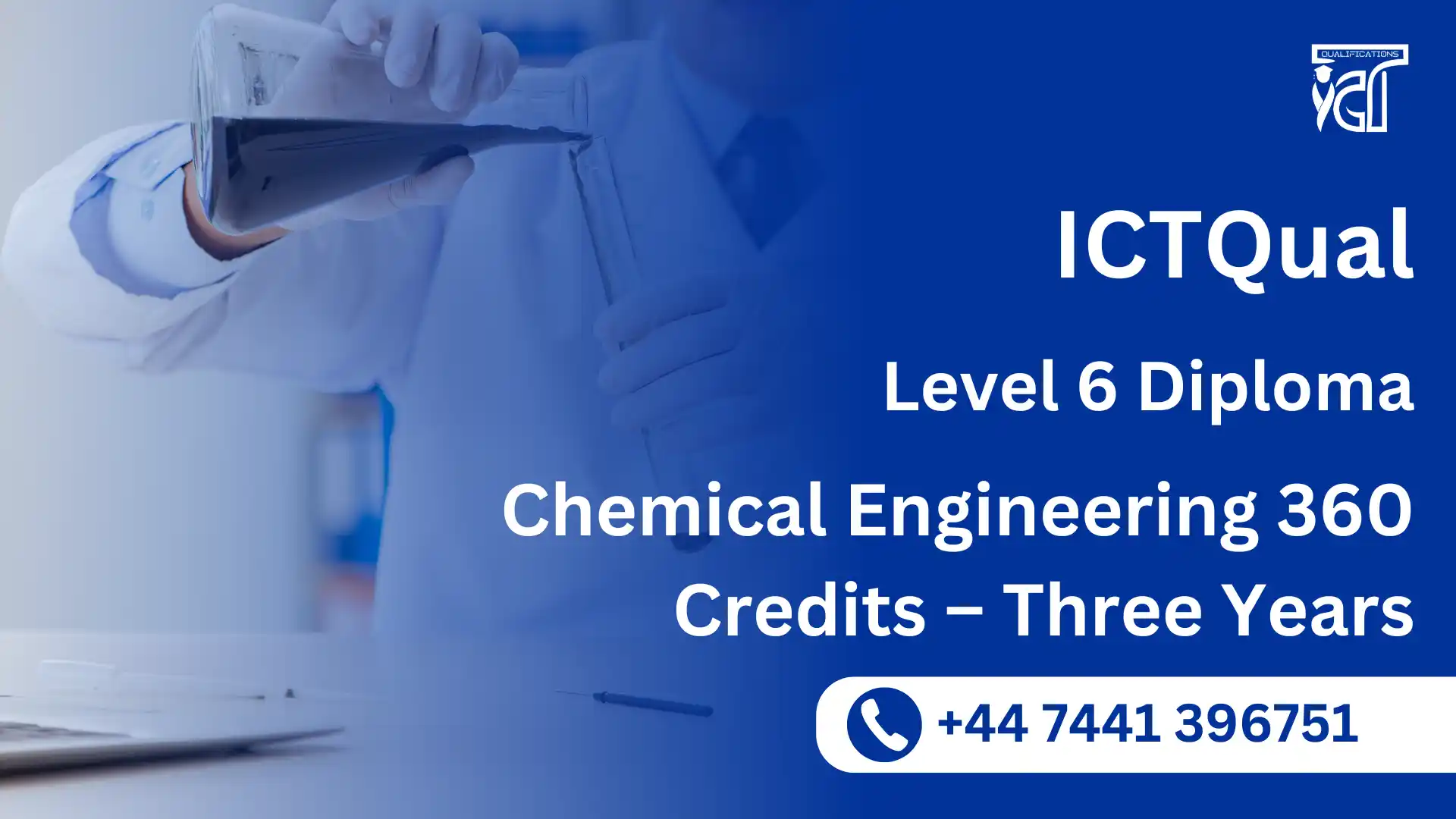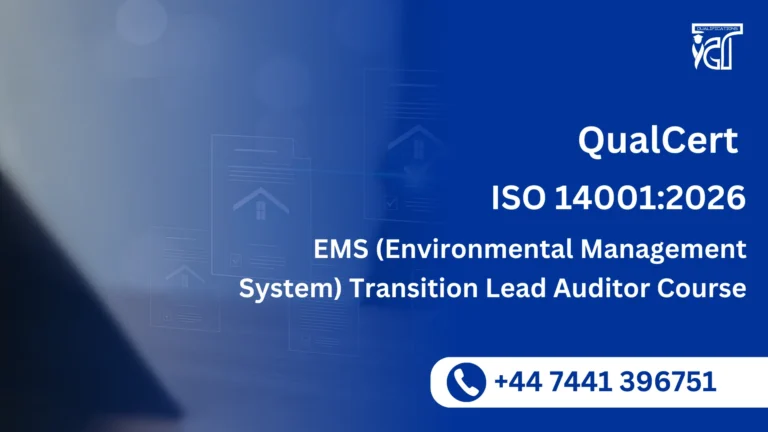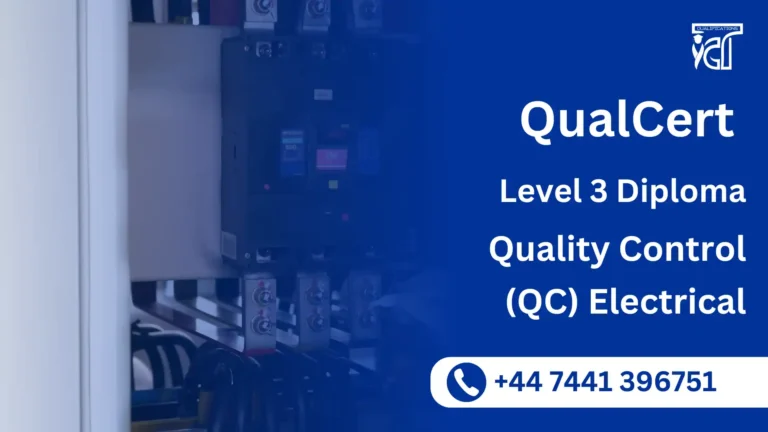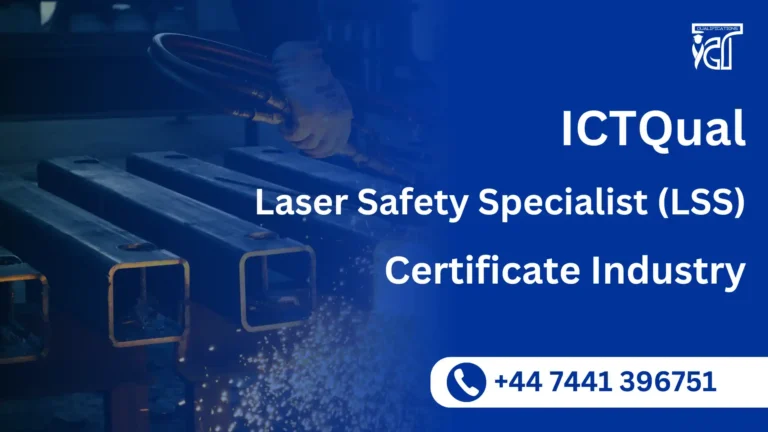The ICTQual Level 6 Diploma in Chemical Engineering 360 Credits – Three Years is a comprehensive three-year programme designed to equip learners with advanced technical knowledge and practical skills essential for the chemical and process industries. Structured around a 360-credit framework, this diploma provides in-depth understanding of chemical processes, industrial operations, process design, safety management, and emerging technologies. It is ideal for both freshers entering the field and professionals seeking to enhance their expertise or progress into specialised and managerial roles.
Learners undertaking this programme will develop expertise in areas such as chemical process design, thermodynamics, reaction engineering, process safety, and industrial automation. Through practical projects, laboratory experiments, and analytical exercises, learners gain the competence and confidence to optimise processes, solve complex engineering challenges, and contribute to sustainable industrial practices. The programme also enhances critical thinking, problem-solving, and project management skills, preparing learners to meet industry demands effectively.
Upon successful completion, learners can pursue careers as chemical engineers, process engineers, production managers, safety engineers, or technical consultants in chemical manufacturing, petrochemical plants, pharmaceuticals, and research and development organisations. The diploma also prepares learners for leadership positions, enabling them to manage projects, implement innovative solutions, and drive operational excellence in industrial environments.
Key benefits of the programme include mastery of advanced chemical engineering principles, hands-on experience with industrial processes and laboratory techniques, enhanced employability, development of analytical and project management skills, and preparation for technical and managerial roles within the chemical sector. Whether learners are beginning their professional journey or advancing their existing expertise, the ICTQual Level 6 Diploma in Chemical Engineering provides a strong foundation for long-term career success and global opportunities in the chemical and process industries.
ICTQual Level 6 Diploma in Chemical Engineering 360 Credits – Three Years
This qualification, the ICTQual Level 6 Diploma in Chemical Engineering 360 Credits – Three Years, consists of 36 mandatory units.
Year 1: Foundation of Chemical Engineering
- Introduction to Chemical Engineering
- Basic Thermodynamics
- Mathematics for Chemical Engineers
- Fluid Mechanics
- Material and Energy Balances
- Introduction to Process Control
- Chemistry for Chemical Engineers
- Introduction to Reaction Engineering
- Engineering Drawing and CAD
- Professional Skills Development
- Heat and Mass Transfer Fundamentals
- Chemical Engineering Principles
Year 2: Advanced Chemical Engineering Concepts
- Advanced Thermodynamics
- Heat Transfer
- Mass Transfer Operations
- Chemical Process Design
- Industrial Chemistry
- Process Systems Engineering
- Fluid Dynamics and Flow Systems
- Reaction Engineering
- Environmental Engineering
- Process Control and Automation
- Process Modeling and Simulation
- Engineering Materials
Year 3: Specialization and Industry Application
- Advanced Process Control
- Process Safety and Risk Management
- Chemical Plant Design
- Sustainable Chemical Engineering
- Separation Technology
- Computational Fluid Dynamics (CFD)
- Advanced Materials Science
- Process Optimization
- Industrial Placement / Internship
- Capstone Project
- Project Management for Chemical Engineers
- Biochemical Engineering
Year 1: Foundation of Chemical Engineering
Introduction to Chemical Engineering
- Understand the fundamental concepts and scope of chemical engineering
- Recognize the role of chemical engineers in industry and society
Basic Thermodynamics
- Apply the laws of thermodynamics to chemical processes
- Analyze energy balances in closed and open systems
Mathematics for Chemical Engineers
- Solve mathematical problems relevant to chemical engineering, including differential equations and linear algebra
- Apply mathematical modeling to engineering systems
Fluid Mechanics
- Understand the behavior of fluids in various engineering systems
- Apply principles of fluid mechanics to solve real-world problems
Material and Energy Balances
- Apply material and energy balance equations to chemical processes
- Solve complex problems involving multi-phase systems
Introduction to Process Control
- Understand basic concepts of process control
- Apply control strategies to simple chemical processes
Chemistry for Chemical Engineers
- Apply principles of general and organic chemistry to chemical engineering
- Understand chemical reactions and their kinetics in industrial applications
Introduction to Reaction Engineering
- Understand the principles of chemical reaction engineering
- Design and analyze simple chemical reactors
Engineering Drawing and CAD
- Develop technical drawings using engineering drawing standards
- Utilize computer-aided design (CAD) software for process design and visualization
Professional Skills Development
- Develop effective communication and teamwork skills in a professional engineering context
- Demonstrate leadership and problem-solving abilities in group projects
Heat and Mass Transfer Fundamentals
- Apply the principles of heat and mass transfer to chemical processes
- Solve problems involving conduction, convection, and diffusion
Chemical Engineering Principles
- Understand key chemical engineering principles such as conservation laws and reaction kinetics
- Apply these principles to solve engineering problems
Year 2: Advanced Chemical Engineering Concepts
Advanced Thermodynamics
- Apply advanced thermodynamic principles to complex chemical processes
- Solve problems involving non-ideal mixtures and phase equilibria
Heat Transfer
- Analyze and design heat exchange systems
- Apply heat transfer principles to industrial processes
Mass Transfer Operations
- Understand mass transfer operations like distillation, absorption, and filtration
- Apply these operations to industrial processes
Chemical Process Design
- Design chemical processes integrating material, energy, and safety considerations
- Develop process flow diagrams and select appropriate equipment
Industrial Chemistry
- Apply chemical principles to industrial processes and products
- Analyze industrial chemical reactions and their economic implications
Process Systems Engineering
- Apply systems thinking to design and optimise chemical processes
- Use process simulation and optimisation software to enhance performance
Fluid Dynamics and Flow Systems
- Understand fluid behaviour in laminar and turbulent flow regimes
- Apply fluid dynamics to pipelines, pumps, and other flow systems
Reaction Engineering
- Design and optimise chemical reactors for industrial-scale applications
- Analyse and solve complex reactor performance problems
Environmental Engineering
- Understand the environmental impact of chemical processes
- Develop strategies to minimise waste and pollution in chemical industries
Process Control and Automation
- Apply control theory to chemical process systems
- Implement automation strategies in industrial chemical processes
Process Modelling and Simulation
- Use modelling and simulation tools to predict chemical process behaviour
- Develop dynamic models for process analysis and optimisation
Engineering Materials
- Understand properties and applications of materials used in chemical engineering
- Select appropriate materials for specific engineering applications
Year 3: Specialization and Industry Application
Advanced Process Control
- Apply advanced control strategies to optimise complex chemical processes
- Design and implement advanced control systems in industrial settings
Process Safety and Risk Management
- Understand principles of process safety and risk assessment
- Develop strategies for preventing accidents and managing risks in chemical plants
Chemical Plant Design
- Design and optimise large-scale chemical plants considering economic, environmental, and safety factors
- Develop detailed engineering designs for chemical plant operations
Sustainable Chemical Engineering
- Apply sustainable engineering principles to reduce environmental impact
- Develop strategies for improving energy efficiency and waste reduction
Separation Technology
- Understand and apply separation technologies such as filtration, distillation, and membrane processes
- Design separation processes for specific industrial applications
Computational Fluid Dynamics (CFD)
- Apply CFD tools to model and simulate fluid flow in complex chemical systems
- Use CFD for optimisation and design of chemical processes
Advanced Materials Science
- Understand properties and applications of advanced materials in chemical engineering
- Design and select materials for innovative engineering solutions
Process Optimisation
- Apply optimisation techniques to improve efficiency and cost-effectiveness
- Use data-driven methods to optimise chemical process performance
Industrial Placement / Internship
- Gain practical experience in the chemical engineering industry
- Apply academic knowledge to solve real-world engineering problems
Capstone Project
- Apply knowledge and skills gained throughout the programme to a comprehensive project
- Demonstrate problem-solving, research, and design abilities in a professional context
Project Management for Chemical Engineers
- Develop project management skills specific to chemical engineering projects
- Plan, execute, and evaluate projects, managing resources, time, and budgets
Biochemical Engineering
- Apply chemical engineering principles to biological and biochemical processes
- Design and optimise systems for the production of bio-based products and energy
The ICTQual Level 6 Diploma in Chemical Engineering equips learners with the knowledge, technical expertise, and practical skills necessary to excel in the chemical and process industries. The programme is designed to enhance employability, develop advanced problem-solving capabilities, and prepare learners for both technical and managerial roles. Graduates gain a competitive edge in the industry by mastering cutting-edge technologies, process optimisation techniques, and safety practices essential for modern chemical engineering.
Advanced Technical Expertise
- Master core and advanced principles of chemical engineering including thermodynamics, reaction engineering, and process control
- Gain proficiency in industrial chemical processes, plant design, and system optimisation
- Develop expertise in emerging technologies such as biochemical engineering, sustainable processes, and computational fluid dynamics
Practical and Hands-On Learning
- Apply theoretical knowledge through laboratory work, simulations, and industry-based projects
- Gain experience in process modelling, plant operations, and real-world problem solving
- Develop critical skills for analysing, troubleshooting, and improving chemical processes
Career Progression and Employability
- Prepare for roles such as Chemical Engineer, Process Engineer, Plant Manager, Safety Engineer, or Technical Consultant
- Enhance professional credibility and increase employability across chemical, pharmaceutical, and petrochemical industries
- Build a foundation for leadership, supervisory, and specialist positions within industrial operations
Leadership and Project Management Development
- Learn project management techniques applicable to chemical engineering projects
- Develop leadership, team coordination, and decision-making skills
- Gain capabilities for managing resources, timelines, budgets, and safety compliance in professional settings
Global and Industry-Relevant Opportunities
- Understand international chemical engineering standards, environmental regulations, and industry best practices
- Access career opportunities in manufacturing, research and development, pharmaceuticals, and chemical production worldwide
- Develop transferable skills for working on global projects and contributing to innovative industrial solutions
The ICTQual Level 6 Diploma in Chemical Engineering is designed for learners who are committed to building a successful career in the chemical and process industries. It caters to both freshers entering the field and professionals seeking to advance their expertise or specialise in cutting-edge areas of chemical engineering. Learners should be motivated to develop technical, analytical, and leadership skills to succeed in complex industrial environments.
Aspiring Chemical Engineers
- Fresh learners seeking a strong foundation in chemical engineering principles
- Individuals aiming to secure entry-level positions in chemical production, plant operations, or research and development
- Learners interested in gaining practical experience through laboratory work and industrial projects
Experienced Professionals Seeking Advancement
- Engineers or technicians looking to enhance their qualifications and technical knowledge
- Professionals targeting managerial, supervisory, or specialised roles within chemical industries
- Learners aiming to develop expertise in process optimisation, plant design, and sustainable engineering practices
Career Switchers
- Individuals from related engineering or scientific backgrounds looking to transition into chemical engineering
- Learners seeking formal recognition and certification to validate their skills and knowledge
- Those interested in acquiring advanced chemical engineering competencies to enhance employability
Lifelong Learners
- Individuals committed to continuous professional development and upskilling
- Learners wishing to stay updated with emerging technologies, industry standards, and safety regulations
- Professionals aiming to enhance problem-solving, analytical, and project management capabilities
Globally-Minded Professionals
- Learners aspiring to work in international chemical, petrochemical, or pharmaceutical industries
- Individuals seeking transferable skills applicable across multiple countries and industrial sectors
- Professionals aiming to contribute to innovative projects and sustainable engineering solutions
Completing the ICTQual Level 6 Diploma in Chemical Engineering equips learners with the technical expertise, practical experience, and leadership skills necessary to excel in the chemical, petrochemical, pharmaceutical, and process industries. Graduates can access a variety of career and academic pathways, both locally and internationally.
Senior Technical Roles
- Progress to positions such as Senior Chemical Engineer, Process Engineer, or Plant Engineer
- Lead the design, optimisation, and operation of complex chemical processes
- Take responsibility for implementing innovative and efficient solutions in industrial settings
Project Management and Leadership Opportunities
- Transition into project management roles overseeing chemical engineering projects from planning to execution
- Manage teams, resources, timelines, and budgets in industrial projects
- Develop leadership, communication, and decision-making skills for supervisory positions
Specialisation in Advanced Chemical Engineering Fields
- Gain expertise in areas such as biochemical engineering, sustainable chemical processes, process optimisation, and computational fluid dynamics
- Pursue specialised roles in plant design, chemical R&D, safety management, or industrial automation
- Develop consultancy and advisory skills for solving complex industry challenges
Academic and Professional Advancement
- Use the diploma as a foundation for postgraduate studies or professional certifications in chemical engineering and related fields
- Access advanced training and research opportunities to deepen knowledge and expertise
- Strengthen professional credentials for international recognition and career mobility
Global Career Opportunities
- Access international positions in chemical manufacturing, petrochemical plants, pharmaceutical industries, and research organisations
- Apply transferable skills to contribute to global projects and innovative engineering solutions
- Enhance employability in diverse industrial environments, including sustainability-focused and emerging technology sectors
Route 1: For Experienced Candidates
This route is ideal for learners who already have substantial work experience in the chemical or process engineering industry.
- Eligibility: Learners must have at least six years of verifiable experience in chemical engineering or a related technical field.
- Assessment of Competence: Learners are not required to complete the full training programme. Our ICTQual Approved Training Centre will assess whether their existing knowledge and skills meet the learning outcomes of the diploma.
- Evidence Submission: Candidates must provide documentation verifying their work experience, including roles, responsibilities, and tasks that demonstrate competence in chemical engineering principles.
- Knowledge Verification: Centres ensure learners are familiar with all course learning outcomes. If any gaps are identified, additional guidance or focused learning may be provided.
- Certification: Upon successful verification of experience and competence, learners will be awarded the ICTQual Level 6 Diploma in Chemical Engineering.
Route 2: For Fresh Learners
This route is suitable for individuals new to the chemical engineering field without prior work experience.
- Admission: Learners must enrol through our ICTQual Approved Training Centre to access the programme.
- Training: Learners complete structured training covering all essential study units, including theory, practical work, and industry-relevant projects.
- Assignments: Fresh learners are required to complete 36 assignments aligned with the learning outcomes of the course. These assignments develop both theoretical knowledge and practical skills.
- Assessment and Certification: After successfully completing all assignments and assessments, learners will be awarded the ICTQual Level 6 Diploma in Chemical Engineering.
Both routes ensure that learners, whether experienced professionals or fresh entrants, gain the knowledge, skills, and formal recognition needed to advance their careers in the chemical engineering industry.
Entry Requirements
Minimum Age
- Learners must be at least 18 years old at the time of enrolment.
Educational Background
- A minimum of high school completion (or equivalent) with strong foundations in mathematics and science is recommended.
- Prior qualifications in chemistry, physics, or engineering-related fields are advantageous but not mandatory for fresh learners.
Work Experience
- Experienced Candidates: Must have at least six years of verifiable experience in chemical engineering or a related technical field.
- Fresh Learners: No prior work experience is required; learners will complete the full training programme and 36 assignments to gain the diploma.
Language Proficiency
- Learners must demonstrate proficiency in English, both written and spoken, to engage effectively with course materials, complete assignments, and participate in assessments.
- Standardised English language qualifications or internal assessment by the training centre may be required.
Register Now
Qualification Process
Qualification Process for the ICTQual Level 6 Diploma in Chemical Engineering 360 Credits – Three Years
- Self-Assessment:
Begin by evaluating your eligibility to ensure you meet the qualification requirements, including work experience, knowledge, and language proficiency. - Registration:
Complete your registration by submitting the required documents, including a scanned copy of a valid ID, and paying the registration fee. - Induction:
An assessor will conduct an induction to confirm your eligibility for the course and explain the evidence requirements. If you do not meet the criteria, your registration will be cancelled, and the fee will be refunded. - Assignments & Evidence Submission:
Provide all assignments and the necessary evidence based on the assessment criteria outlined in the course. If you are unsure of the required evidence, consult with the assessor for guidance on the type and nature of evidence needed. - Feedback and Revision:
The assessor will review your submitted evidence and provide feedback. Evidence that meets the criteria will be marked as “Criteria Met,” while any gaps will be identified. You will be asked to revise and resubmit if needed. - Competence Evidence:
Submit final evidence demonstrating that all learning outcomes have been met. This evidence will be marked as “Criteria Met” by the assessor once it is satisfactory. - Internal Quality Assurance (IQA):
The Internal Quality Assurance Verifier (IQA) will review your evidence to ensure consistency, quality, and compliance with standards. - External Verification:
The IQA will submit your portfolio to ICTQUAL AB External Quality Assurance Verifiers (EQA) for final confirmation. The EQA may contact you directly to verify the authenticity of your evidence. - Certification:
Upon successful completion of all checks, ICTQUAL AB will issue your official certificate, confirming that you have attained the ICTQual Level 6 Diploma in Chemical Engineering 360 Credits – Three Years.







